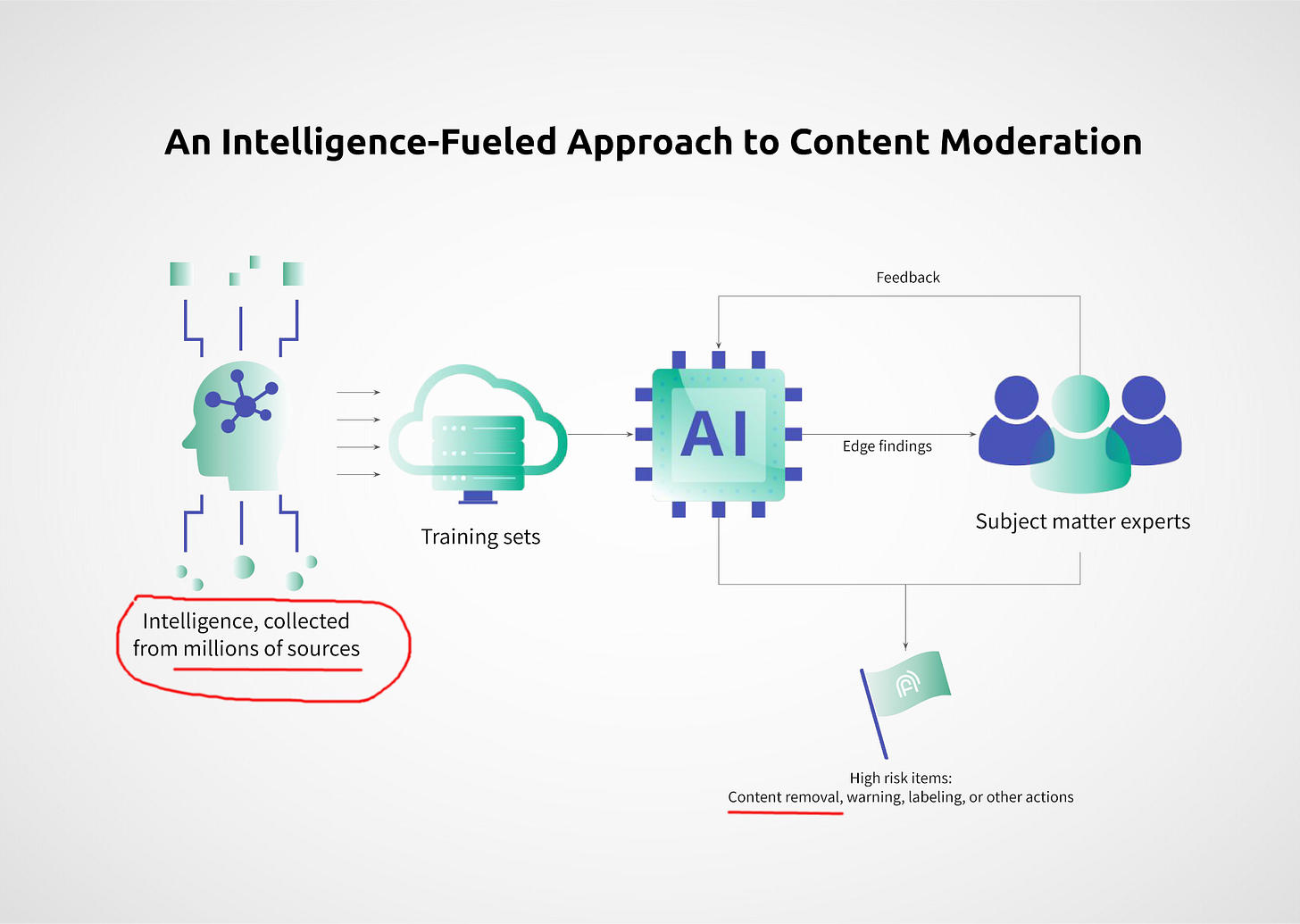 Parler
Parler Gab
Gab
 So, WEF author Inbal Goldberger came up with a solution: she proposes to collect off-platform intelligence from “millions of sources” to spy on people and new ideas, and then merge this information together for “content removal decisions” sent down to “Internet platforms”.
So, WEF author Inbal Goldberger came up with a solution: she proposes to collect off-platform intelligence from “millions of sources” to spy on people and new ideas, and then merge this information together for “content removal decisions” sent down to “Internet platforms”.
To overcome the barriers of traditional detection methodologies, we propose a new framework: rather than relying on AI to detect at scale and humans to review edge cases, an intelligence-based approach is crucial.
By bringing human-curated, multi-language, off-platform intelligence into learning sets, AI will then be able to detect nuanced, novel abuses at scale, before they reach mainstream platforms. Supplementing this smarter automated detection with human expertise to review edge cases and identify false positives and negatives and then feeding those findings back into training sets will allow us to create AI with human intelligence baked in. This more intelligent AI gets more sophisticated with each moderation decision, eventually allowing near-perfect detection, at scale.What is this about? What’s new? The way censorship is done these days is that each Internet platform, such as Twitter, has its own moderation team and a decision making engine. Twitter would only look at tweets by any specific twitter user, when deciding on whether to delete any tweets or suspend their authors. Twitter moderators do NOT look at Gettr or other external websites. So, for example, user @JohnSmith12345 may have a Twitter account and narrowly abide by Twitter rules, but at the same time have a Gettr account where he would publish anti-vaccine messages. Twitter would not be able to suspend @JohnSmith12345’s account. That is no longer acceptable to the WEF because they want to silence people and ideas, not individual messages or accounts. This explains why the WEF needs to move beyond the major Internet platforms, in order to collect intelligence about people and ideas everywhere else. Such an approach would allow them to know better what person or idea to censor — on all major platforms at once. They want to collect intelligence from “millions of sources”, and train their “AI systems” to detect thoughts that they do not like, to make content removal decisions handed down to the likes of Twitter, Facebook, and so on. This is a major change from the status quo of each platform deciding what to do based on messages posted to that specific platform only. For example, in addition to looking at my Twitter profile, WEF’s proposed AI would also look at my Gettr profile, and then it would make an “intelligent decision” to remove me from the Internet at once. It is somewhat of a simplification because they also want to look for ideas and not only individuals but, nevertheless, the search for wrongthink becomes globalized.
 This sounds like an insane conspiracy theory from hell: WEF collecting information on everyone everywhere, and then telling all platforms what posts to remove, based on a global decision-making AI engine that sees everything and can identify individual people and ideas beyond any given platform.
If someone ever told me that it would be contemplated, I would probably think that this person is insane. It sounds like a sick technological fantasy or a far-fetched conspiracy theory. Unfortunately, this crazy stuff is real, is in a WEF agenda proposal that is officially posted on their website’s “WEF Agenda” section. And WEF is not messing around.
You will have no voice and you will be happy!
Read more at: IgorChudov.Substack.com
This sounds like an insane conspiracy theory from hell: WEF collecting information on everyone everywhere, and then telling all platforms what posts to remove, based on a global decision-making AI engine that sees everything and can identify individual people and ideas beyond any given platform.
If someone ever told me that it would be contemplated, I would probably think that this person is insane. It sounds like a sick technological fantasy or a far-fetched conspiracy theory. Unfortunately, this crazy stuff is real, is in a WEF agenda proposal that is officially posted on their website’s “WEF Agenda” section. And WEF is not messing around.
You will have no voice and you will be happy!
Read more at: IgorChudov.Substack.com
Vaccinated blood is tainted blood, study finds
By Ethan Huff // Share
Japan mulls dropping COVID testing requirement for travelers
By Ramon Tomey // Share
Bank Australia to stop approving loans for new fossil fuel cars, will only handle car loans for EVs
By Arsenio Toledo // Share
Meet BlackRock: The ‘architect of woke capitalism’ destroying America from within
By News Editors // Share
New York Times (the journalistic version of a “Karen”) whines to TikTok to censor Americans
By News Editors // Share
Governments continue to obscure COVID-19 vaccine data amid rising concerns over excess deaths
By patricklewis // Share
Tech giant Microsoft backs EXTINCTION with its support of carbon capture programs
By ramontomeydw // Share
Germany to resume arms exports to Israel despite repeated ceasefire violations
By isabelle // Share










